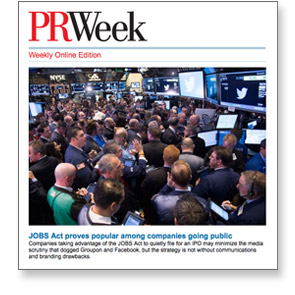 PRWeek
PRWeek
By Chris Daniels
Companies taking advantage of the JOBS Act to quietly file for an IPO may minimize the media scrutiny that dogged Groupon and Facebook, but the strategy is not without communications and branding drawbacks.
Groupon, which went public before the JOBS Act went into effect 18 months ago, had a well-reported back-and-forth with the Securities and Exchange Commission about its accounting metrics. Similarly, Facebook drew public scrutiny from the SEC about figures pertaining to its mobile business and advertising growth rates.
Yet after the Jumpstart Our Business Startups Act became law a year and a half ago, companies with less than $1 billion in annual revenue can file paperwork to go public confidentially and their correspondence with the SEC stays private temporarily. A firm only has to publicly release its paperwork 21 days before its investor road show begins.
Put simply, the law means that companies have a better chance at a stronger public debut.
“Companies can now get it right behind closed doors first. Then they can go out with a stronger story than they might have had they filed normally,” says Tom Rozycki, MD of Prosek Partners, noting that SEC revision requests are par for the course.
He notes that a confidential submission is a particularly good strategy for some technology companies – Twitter and GoPro are among those that have used the law – as they would likely see increased scrutiny from regulators because they do not have historical financial statements.
“There are often CFOs or investor relations officers at wildly successful startups who maybe have only been in the position for 24 or 36 months,” Rozycki adds. “This helps them be able to present a clear and accurate picture of the company to institutional and retail investors in its first public document.”
Last November, Twitter went public after filing confidentially. In fact, according to multiple sources, 90% of the 126 companies that filed for IPOs on the Nasdaq exchange last year went public as “emerging growth companies,” a new class that emerged as a result of the JOBS Act.
More recently, video camera maker GoPro and cloud storage company Box have filed to go public confidentially. Yet technology makers are not the only ones that see the advantages of using the JOBS Act. Boutique investment bank Moelis & Company and energy firm Opower have filed for IPOs in that way since the start of the year.
PRWeek reached out to a number of the above companies about the strategy, but none provided comment.
Scott Tangney, EVP at Makovsky Integrated Communications, says the biggest advantage of the JOBS Act is that companies can withdraw their filing without raising any flags that they had intended to file or revealing financial information to competitors.
However, he warns that “companies that use this path are under the radar completely.”
“IPOs are a branding opportunity for companies. The best programs are placed into action years before the event, especially if there are any misperceptions or issues that the company needs to address,” explains Tangney. “For most companies with little media following them, there is more of a burden on creating a brand after news of the IPO emerges and the listing occurs.”
He adds that “companies might be able to raise the capital, but they have to communicate what they're doing with it and what the business is about, both to investors and their client base and influencers.”
“That puts immediate pressure on most companies,” Tangney explains.
Companies can have it both ways. Jason Golz, partner in the San Francisco office of Brunswick Group, counters that firms do not necessarily have to keep quiet when they make a confidential IPO submission to the SEC – although many do so because they do not know if they will go through with the process.
Twitter, for instance, revealed – naturally via a tweet – that it had confidentially filed for an IPO well in advance of its official public filing.
Also, the mandated quiet period does not start until 30 days before the public filing, meaning companies can take advantage of a shorter quiet period of only about three months, versus the six to nine months without a confidential submission of an S-1 form, Golz adds.
“A lot of times, companies don't think about telling their corporate story until they get closer to filing the IPO and then they realize, ‘Oh, shoot, it is too late because now we're in a quiet period,'” he explains. “Companies under the JOBS Act provision now have a few more months in which they can execute a communications plan for the IPO because technically the quiet period starts later.”
Golz adds that while he “can't think of too many companies that have not taken advantage of the confidential submission provision, if they can,” not every element of the JOBS Act has proven popular. Companies are only required by the law to file two years of audited financial statements in their IPO registration, versus the usual three.
“I don't see as many companies withholding a third year of financial statements because that's often perceived as a sign of weakness from the investor point of view,” he notes.
